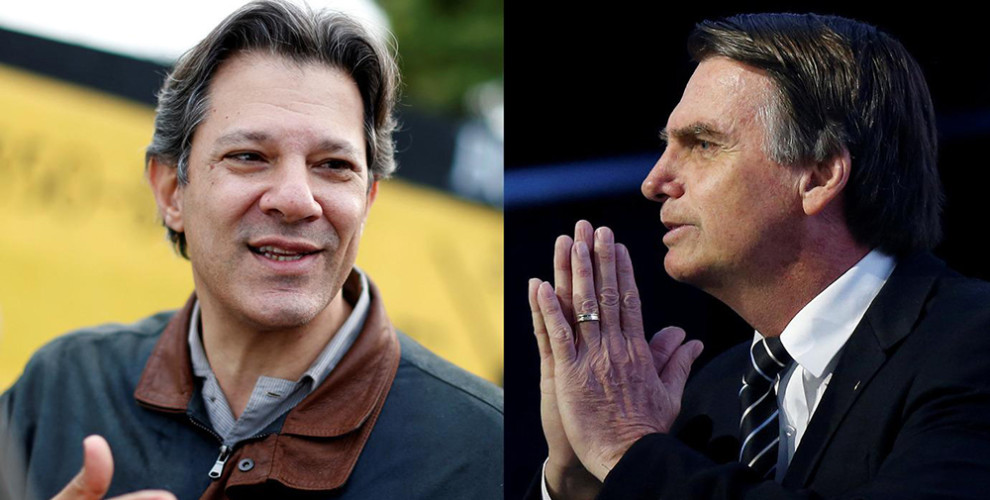The extreme-right candidate aims at winning Brazil Presidency
The right candidate Jay Bolsonaro got 46% while the coalition headed by the leftist Workers' Party candidate Fernando Haddad got slightly over 27% of the votes.
The right candidate Jay Bolsonaro got 46% while the coalition headed by the leftist Workers' Party candidate Fernando Haddad got slightly over 27% of the votes.

On Sunday 7 October, 147 million voters were summoned to the polls in Brazil to elect their President, 27 Governors of States, 513 deputies and 54 senators (two thirds of its members).
The official results granted victory, in the first round and with an abstention of 30 million voters, to the candidate of the far right, Jay Bolsonaro. He got 46% of the valid votes while the coalition headed by the leftist Workers' Party (PT), represented by Fernando Haddad, managed to get something more than 27% of the votes.
Third came the representative of the center-left, Ciro Gómez, with a remote 12%, while the other 13 candidates barely obtained residual results, which, however, can be decisive for the second round.
The far-right candidate, Bolsonaro, is not exactly an unknown politician because he has been a deputy for 17 years. A former army captain, he has defended the bloody dictatorship that Brazil suffered between 1965 and 1985, and justified the widespread torture of that period, his constant pronouncements indicate him as openly racist, macho and enemy of sexual diversity, as well as a vehement anti-left, and anti-trade union and social movements.
Although its government plan is diffuse, he has not wanted to commit itself to concrete measures and has rather preferred to express "general ideas" that would guide its possible mandate: privatization of public enterprises, suppression of social policies, strong and repressive policies in the face of citizen insecurity, exit from the Paris Agreement on climate change, drastic reduction of the central public administration, war against the left, and the like.
To challenge Bolsonaro is the candidate of the PT, Fernando Haddad, who was mayor of Sao Paulo and minister of Education during the governments of Lula Da Silva. And it was Lula himself who has chosen him when he was prevented from presenting himself to the elections as he has been condemned to 12-year sentence for passive corruption and money laundering, in a process full of irregularities and political interference.
The Haddad program seeks to reissue the progressive proposals of the PT and its traditional allies for ten years: recovery of social policies, reduction of taxes to the most disadvantaged sectors and rise in the taxes of the richest sectors, maintenance of the public companies, land reform and real estate ...
This South American giant, which ranks as the eighth economy in the world and is the second Latin American, behind Mexico, has just over 210 million inhabitants, is founder and is part of the BRICS, and is a key country for its potential in the regional.
The country has been in a deep crisis since at least 2016 when its President Dilma Rousseff, of the Workers Party, was dismissed from her post by a parliamentary coup with technical arguments, which has radicalized and finally fractured the society, as the election results showed.
Corruption occupies a large part of the political and institutional strata. Suffice it to say that of the 512 current deputies 299 are under investigation for corruption and 76 have already been convicted; levels of insecurity are among the highest in the world, only last year there were 63,880 homicides. The economic crisis beyond the macro-economic data impacts daily in many sectors through the growth of unemployment and poverty together with a constant loss of the purchasing power of wages, in a society where the distribution of income is of the highest unequal of the world.
This crisis of legitimacy has taken its toll, not only within the PT, but within all traditional parties and politicians, from right to left, and have been the breeding ground for the emergence of a kind of "saviour of the Fatherland", in the figure of Bolsorano, with short and simple messages of hard and radical policies.
Despite the importance of the position of President, it must be remembered that Brazil is a very diverse country at regional level, and has a federal system, and for the executive to carry out its policies it requires a constant game of alliances and pacts with the Governors, the numerous parliamentary groups, and other economic and social sectors.
The figures of this first round reflected a decline of the PT in the number of deputies and senators, as shows the loss of 10 seats in the Parliament or the fact that ex-President Dilma Rousseff herself only reached the fourth position as candidate for the Senate in her state, one of the three largest, of the country, Minas Gerais.
So in addition to see who will be the next President we will also have to observe the correlation of forces and alliances, both in the states and in Parliament and the Senate, to see the governance on which the new President could count on.
On the 28 of October the Brazilian voters will decide. It is clear that Bolsorano only needs a slight shift of votes from the parties of the traditional right to win, while Haddad has in just 20 days an almost impossible mission: that of getting a coalition made of all the other candidates to vote for him. From the traditional right to the radical left, and practice indicates that when you win by the right you lose by the left.
In any case, the result may also depend on the perception of Bolsano as an antidemocratic "danger" for almost everyone, and also on the capacity to mobilize part of the abstention.
For now a piece of information can point to the possible winner: Brazilian stock exchanges rose more than 6% the day after the first round.
The Brazilian oligarchy seems to have already decided who is their preferred candidate.